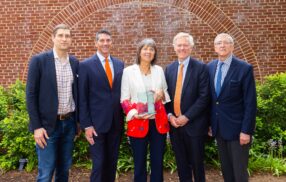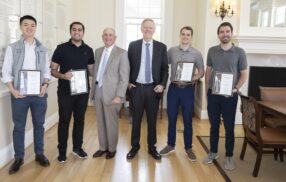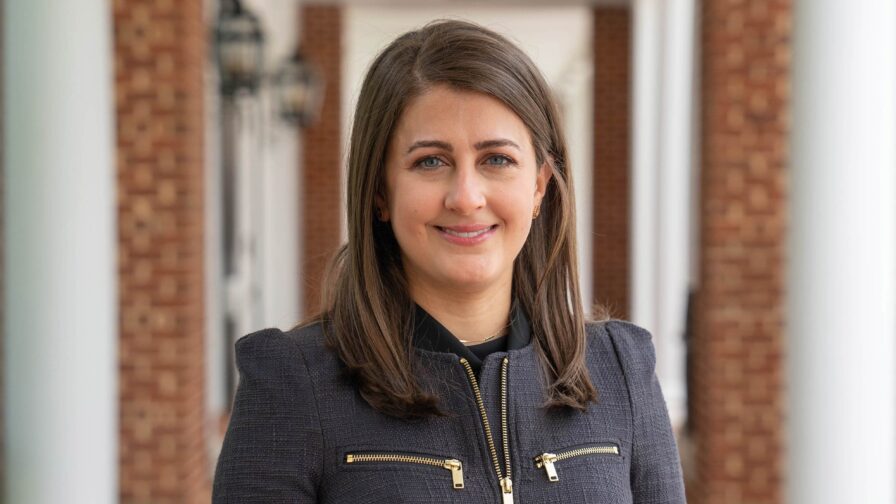
Talking Teaching Tactics With Darden’s Kinda Hachem
By Caroline Newman
When graduates of the University of Virginia’s Darden School of Business earned their degrees in May, Kinda Hachem was on hand to lead the way as faculty marshal, a student-selected honor.
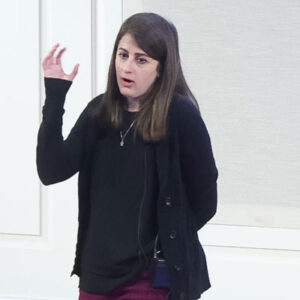
Hachem discussing the economics of cryptocurrency during Darden Reunion Weekend 2022
Hachem, the Morris Plan Associate Professor of Consumer Credit in Darden’s Global Economies and Markets area, also recently received Darden’s Outstanding Faculty Honor, another student-voted award, and has several other teaching awards to her name, including a 2020 mention as a “Top 40 Under 40” professor (Poets and Quants) and a teaching excellence award from the University of Toronto’s Department of Economics.
At Darden, Hachem teaches one of the MBA program’s core first-year courses, Global Economies and Markets, as well as an elective, The Economics of Money and Banking. The courses reflect her academic background, which includes a doctorate in economics from the University of Toronto, and her professional background working at RBC Financial Group and the Bank of Canada.
As Hachem tells it, teaching has always been something that she enjoyed, but it is also a skill that she has refined over the years, especially since moving from the University of Chicago’s Booth School of Business to Darden in 2018 and gaining experience with Darden’s case teaching method, which emphasizes student participation and group discussion over traditional lectures.
We caught up with Hachem to learn more about her teaching philosophy, what she enjoys about Darden students and more.
Q. Can you talk a bit about how you approach teaching?
A. Before I was at Darden, my previous school incorporated more lecture-style teaching and had a kind of free market approach, or the idea that the market — in this case, course evaluations — would tell you what was working and what was not. That was where I was coming from. I would go into class with a set of things that I wanted to cover and cover them in the best way that I could.
At Darden, the case method, or the Socratic method, seemed very foreign to me at first. However, I soon realized the basic idea is not entirely different. I still walk in with main points that I want to cover. However, it is not me who is designing how we get there — it is the students. The students lead the discussion and figure it out in real time. I provide guardrails, if you will, to make sure that we get to the lessons that we need to get to, but the format also allows for more rabbit holes and more curiosity, as long as it does not completely derail the discussion. I am there as a facilitator, making sure we converge around the main points that we need to cover.
Q. Have you found the case method to be effective?
A. Absolutely. It makes students engage with the material differently. When you give a lecture, it is hard to know if students are paying attention or understanding. You might see one person’s face light up, but it’s hard to tell if what you are saying is getting through.
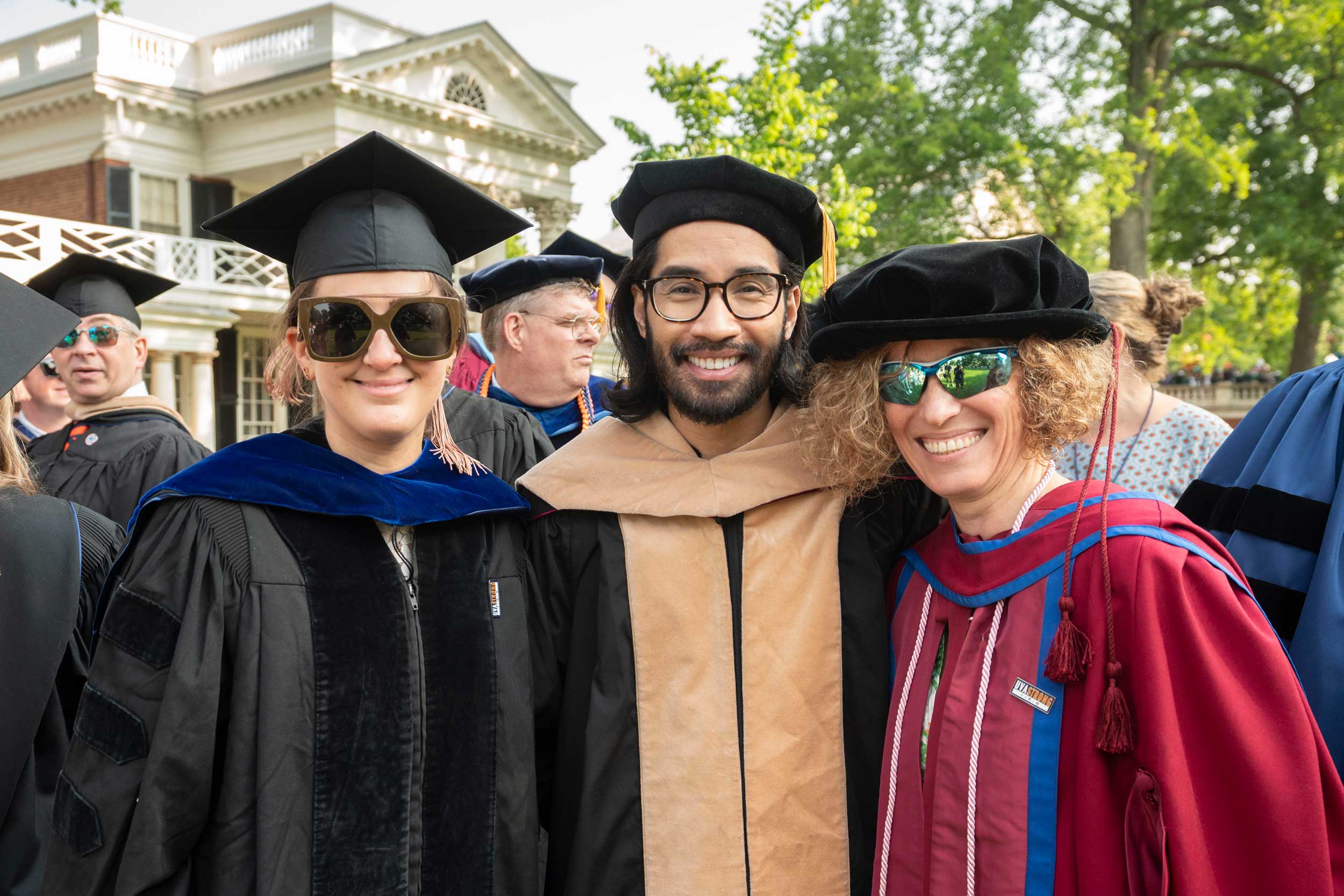
Hachem, left, was selected by her students as a faculty marshal, an honor that meant she led them down the Lawn for Final Exercises this year. (Photo by Sanjay Suchak, University Communications)
In our classrooms, because participation is a big part of the grade, everyone has an incentive to contribute and I can see, in real time, if they have internalized what we are learning. I also believe it contributes to retention. Having a peer explain a concept to you, in a discussion format, resonates more.
Q. What motivates you as a teacher?
A. It sounds corny, but it is true: It is the “aha!” moment when a student gets something, or a student’s face when they understand something they were struggling with. There is no bigger reward than that. When you see something click, it is really motivating.
Q. How do you make some of the economic concepts that you teach accessible to students?
A. I teach a core class that first-year Darden students have to take, and then an elective class, Money and Banking. My approach is different across the two.
All of the students in my elective course have already taken some economics because of the core and some even have a professional background in economics from their time before Darden. They also chose to take the class and are therefore predisposed to be interested in the material. So, we can do really interesting deep dives into subjects.
My core class is also really exciting, just in a different way. Some of the students do not have a background in economics, while others do. One of my big goals is to help students to be precise in their questions and formulate questions about material that they might not understand. I tell them that asking questions is a key way to participate, and that verbalizing questions is helpful for other people. I try to create conversation between students who have not seen the material before and students who have, or who grasp it more intuitively, and engage both groups while helping them to learn from each other.
At the end of the day, I try to make the class comfortable for everyone, whether you are an expert or you have never seen any of this before. I try to bring as many people on board as I can.
Q. Darden is also known for having a close-knit community outside of the classroom. How do you build relationships with students over their time there?
A. I actually somewhat resisted this when I first came because I felt like it was important to have a boundary, especially as a younger faculty member. Over time however, as I have gotten to know students and faculty and they have become familiar with me as a faculty member, I have realized that the barrier does not need to be as strong as I initially thought.
I try to get involved in several different ways. One is a student-run charity auction each year, where faculty often donate something that involves their time, such as a lunch, dinner or outing, to raise money for a good cause. It is very casual — I often end up going with small groups of students for a meal, meeting them for breakfast, that kind of thing. I also participate in specific lunches during the quarter that students organize to get to know their professors better and learn more about our research. In turn, I get to learn more about my students’ backgrounds and what they are interested in, and how we might work together.
Students also tend to stay in touch after they graduate, which is wonderful. I’ll get emails from alumni asking about a recent economic shock, for example, or I sometimes give talks at alumni events — I gave one recently about cryptocurrency.
Q. How do you bring current events into your classroom?
A. I frequently bring current events into my elective courses. We talked a lot about the Silicon Valley Bank collapse this spring, for example. It happened just as we were entering a new quarter and we had a really great open discussion of what was going on and what it said about our financial system. There was a lot of discussion about how the Fed might handle the situation, and about the economic relationship with the Fed in general.
I have found that those kinds of discussions actually make it easier to get through the material that we were scheduled to get through that day. Talking about something that is going on as we speak opens up the conversation, gets everyone engaged and breaks the ice, in a way.
My core class is a bit more structured, but we still bring in current events. [Jung Family Associate Professor of Business Administration] Daniel Murphy, who designed the course, did a great job of integrating the pandemic, which is of course the major economic shock of our time. He wrote a case about the economic effects of COVID, and students could apply all of the fundamental skills they were learning to what was going on at the time.
This story originally appeared in UVA Today.
The University of Virginia Darden School of Business prepares responsible global leaders through unparalleled transformational learning experiences. Darden’s graduate degree programs (MBA, MSBA and Ph.D.) and Executive Education & Lifelong Learning programs offered by the Darden School Foundation set the stage for a lifetime of career advancement and impact. Darden’s top-ranked faculty, renowned for teaching excellence, inspires and shapes modern business leadership worldwide through research, thought leadership and business publishing. Darden has Grounds in Charlottesville, Virginia, and the Washington, D.C., area and a global community that includes 18,000 alumni in 90 countries. Darden was established in 1955 at the University of Virginia, a top public university founded by Thomas Jefferson in 1819 in Charlottesville, Virginia.
Press Contact
Molly Mitchell
Associate Director of Content Marketing and Social Media
Darden School of Business
University of Virginia
MitchellM@darden.virginia.edu



